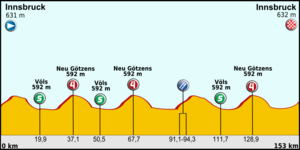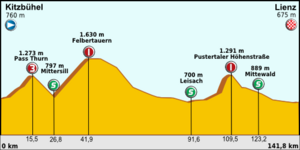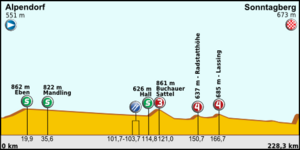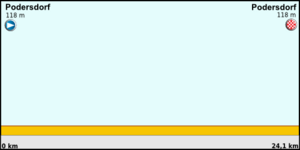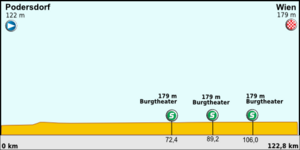|
64th Tour of Austria 2012
|

|
|
Racing series
|
UCI Europe Tour - Category 2.HC
|
|
Host country
|
Austria Austria Austria
|
|
Competition period
|
July 1-8, 2012
|
|
Stages
|
8th
|
|
overall length
|
1,153.9 km
|
|
Starting field
|
142 in 18 teams
(of which 123 arrived at the finish)
|
|
winner
|
|
Overall rating
|
1. Jakob Fuglsang 28:13:09 h 2. Steve Morabito + 1:24 min 3. Robert Vrečer + 1:52 minDenmark
Switzerland
Slovenia
|
|
Team evaluation
|
Luxembourg RadioShack-Nissan 84:43:55 h RadioShack-Nissan 84:43:55 h
|
|
Scoring jerseys
|
 Scoring Scoring
|
Italy Alessandro Bazzana Alessandro Bazzana
|
 Mountain scoring Mountain scoring
|
Austria Georg Preidler Georg Preidler
|
|
course
|

|
| ← 2011
|
2013 →
|
The 64th Tour of Austria was a cycling race that took place from July 1st to 8th, 2012. The 1200-kilometer stage race is part of the UCI Europe Tour 2012 and was classified in the highest category 2. Hors Catégorie . The tour led through seven of the nine Austrian federal states, only Upper Austria and Vorarlberg were not crossed by it.
Participating teams
Six UCI ProTeams , eight UCI Professional Continental Teams and four UCI Continental Teams started .
A detailed starting list can be found on the separate page → Drivers Field 2012 .
Stage overview
The stage plan was presented on May 31, 2011 in Laxenburg .
Ratings in the course of the race
The table shows the leader in the respective classification after the respective stage.
Stages
1st stage
After just a few kilometers, the Upper Austrian Riccaro Zoidl made a successful breakaway attempt together with the French Yohan Bagot. A little later, Matthias Brändle and Stefan Praxmarer and the Hungarian Laszlo Bodrogi caught up with three other drivers. As a result, the quintet managed to pull out a lead of up to seven minutes. After the cooperation within the group did not work as expected, the main field, led by the two Italians Di Luca and Stefano Garzelli, was able to catch up with the outliers around 20 kilometers before the finish line. Because of the high speed and the scorching heat, no driver was able to break away from the field, which resulted in a mass sprint on the 300 meter long and up to 18% steep target ascent to the Bergisel . The 28-year-old Italian Alessandro Bazzana prevailed over his compatriots Francesco Gavazzi and Marco Canola. Bazzana's team-mate Georg Preidler rounded off the success of the Type 1-Sanofi team and became the best Austrian.
2nd stage
After the field had completed the first 60 kilometers closed, three drivers managed to break away in Hopfgarten . The two Austrians Markus Eibegger and Josef Benetseder drove out a lead of up to five minutes together with the French Mickaël Buffaz . Driven by the RadioShack-Nissan team , the main field caught up with the outliers up to the ascent to the Kitzbüheler Horn. Even on the 7.1 kilometer long and up to 22.3% steep climb (865 vertical meters), the RadioShack-Nissan drivers initially set the pace, whereupon the field of drivers soon split up. Up to the toll booth, 4.8 kilometers from the destination, a top group of ten formed. As a result, first David Arroyo and Harald Totschnig and then Jakob Fuglsang and Jure Golčer lost touch . Three kilometers from the finish, the leading group consisted of five drivers, with Thomas Rohrgger and Danilo Di Luca taking the lead. Rohrgger, who had already won this stage in 2007, tried to pull away, but Di Luca countered successfully and was able to pull away alone one kilometer from the finish. The winner of the Giro d'Italia 2007 Danilo Di Luca secured the stage win ahead of the Swiss Steve Morabito, who overtook Rohrgger shortly before the finish line, the stage win.
3rd stage

Sacha Modolo, sprint winner of the 3rd stage.
Ten kilometers after the start, a six-person top group formed, which, in addition to the two Austrians Markus Eibegger and Georg Preidler, also included Yohann Bagot , Florian Guillou , Beñat Intxausti and Andrea Pasqualon . Preidler also secured the first mountain classification on Pass Thurn (1273 meters). In the following, Maxim Belkov , another rider, made the connection to this group, who tackled the climb to the Felbertauern (1630 meters) together. Again Preidler was able to secure the mountain classification. On the ascent on the Pustertaler Höhenstraße, Markus Eibegger increased the pace and shook off the last pursuer Pasqualon. Eibegger secured the mountain classification and drove towards the goal alone. Behind him, Guillou and Intxausti formed a chasing duo, but they were swallowed up by the field. But Eibegger's solo escape was not rewarded either, because he too was caught by the field three kilometers from the finish. This resulted in a mass sprint in Lienz, in which the Austrian Daniel Schorn had to admit defeat to the Italian superiority and crossed the finish line second behind Sacha Modolo.
4th stage

“Glocknerkönig” in 2012 was the Dane Jakob Fuglsang, who also won the stage.
Immediately after the start of the king's stage, the RadioShack-Nissan team launched their first attack with the Austrian Thomas Rohrgger and the Dane Jakob Fuglsang and were able to break away from the main field in a group. Georg Preidler, who rode in this group, was able to secure the first mountain classification on Iselsberg after 7.6 kilometers . The bearer of the yellow jersey, Danilo Di Luca, was able to reconnect as far as Dölsach. On the ascent to the Grossglockner, Leopold König and Jakob Fuglsang separated from the field and moved unstoppably away. Rohrgger was not allowed to follow up due to the team strategy. At the Hochtor , which is 2504 meters high, the 27-year-old Fuglsang could not be deprived of the title of Glockner King 2012, including the € 2504 bonus. Fuglsang also asserts itself on the Fuscher Törl at 2,422 meters above sea level. On the descent, the top duo was able to continuously expand their lead. The ascent to the fourth and final mountain classification to the Dientner Sattel was tackled together, with Fuglsang again prevailing. The lead had already grown to 3:40 minutes. As a result, Leopold König, who had problems with back pain, could no longer keep up with Fuglsang, which is why the Dane reached the finish line with a lead of 1:14 minutes. Fuglsang, who was in 15th place before the stage, replaced the Italian Danilo di Luca, who crossed the finish line in sixth 2:47 minutes behind, as the overall leader.
5th stage

Matthias Brändle from Vorarlberg was delighted about a place on the podium.
On the longest stage of the tour, which was driven in great heat, the field did not miss any outliers for a long time. It was only about 80 kilometers after the start that a top group consisting of twelve drivers formed, which in addition to Bandiera, Bazayev, Bazzana, Belkov, Caccia, Day, Lequatre, Sijmens, Taborre and Vandewalle, Matthias Brändle and Christoph Sokoll, also included two Austrians. Since the leading group harmonized well, the lead on the main field grew by up to twelve minutes. Sokoll also prevailed in the mountain classification on the Buchauer Sattel (category 3), while Benjamin Day ( Radstatthöhe ) and Diego Caccia ( Lassing ) won the two following ratings. It was not until the three-kilometer ascent to the pilgrimage church on Sonntagberg that the attacks began, cheered on by numerous spectators. The Italian Fabio Taborre was able to pull away slightly in the last two kilometers and brought the narrow lead over Marco Bandiera to the finish. Together with him, Matthias Brändle sprinted across the finish line in third place. The peloton was more than nine minutes behind, with Danilo di Luca, who was able to pull away 800 meters from the finish, making up eight seconds on the leader Jakob Fuglsang.
6th stage

Georg Preidler won all three mountain classifications of the 6th stage and thus secured himself an early victory in the overall mountain classification.
The initial phase of the stage was characterized by high speed and numerous attacks. At first none of the escape groups managed to break away from the main field. Only after 50 kilometers on the climb to the first mountain classification Wastl am Wald were eleven drivers able to break away. With Georg Preidler, Markus Eibegger, Riccardo Zoidl and David Wöhrer, four Austrians were among them. Belkov, Santaromita, Intxausti, Molard, Betancur, Locatelli and Duet completed the leading group, which was never left out of the peloton for more than two minutes. Riccardo Zoidl and Rudy Molard were able to pull away a few kilometers before the first crossing of the finish line in Melk and extend their lead to more than three minutes, while the other drivers were overtaken by the main field. After the sprinters in the peloton increased the pace drastically, the lead of the top duo melted away and about ten kilometers before the finish they were also put out of the peloton. In the following mass sprint, the Italian Sacha Modolo once again proved to be the fastest driver and, just like in the third stage, clinched the day's victory again. The best Austrian was Marco Haller, who started the sprint too early. Georg Preidler, who won all three mountain classifications of this stage and was able to post 18 points to his account, ensured an Austrian success, thus securing the overall mountain classification.
7th stage

Marco Pinotti won the individual time trial in Podersdorf.
The seventh stage was the traditional individual time trial from Podersdorf to Illmitz and back over 24.1 kilometers. While overall leader Jakob Fuglsang was able to impressively maintain his position with twelfth place, there were some shifts in rank behind. The fastest legs were the Italian Marco Pinotti, who also finished the final individual time trial victoriously at this year's Giro d'Italia and who distanced runner-up Kristof Vandewalle by 32. Pinotti achieved an average speed of 52.17 km / h. After the previous second Danilo Di Luca was only classified in 46th place with 2:26 minutes behind, he fell back to fourth place overall. The Swiss Steve Morabito, who crossed the finish line in 18th place, 1:24 minutes behind, was new second overall, ahead of the Slovenian Robert Vrečer (15th place, 1:17 minutes behind). As the best Austrian, Ricardo Zoidl finished 14th, 1:16 minutes behind.
8th stage
About 20 kilometers after the start of the flat stage, the Austrian Patrick Konrad broke away together with Pavel Brutt and Johan Le Bon . The trio was able to pull out a lead of more than three minutes. In the first sprint ranking in front of the Vienna Burgtheater , which Brutt von Konrad secured, the lead was still two minutes. Then the main peloton attacked, whereupon the lead in the second sprint classification (sixth lap), which Konrad won ahead of Le Bon, was reduced to one minute. With two laps to go, the trio was overtaken by the peloton. No further breakaway attempt was allowed to reach the target. The field of drivers delivered a thrilling mass sprint, cheered on by numerous spectators on Vienna's Ringstrasse . Alessandro Bazzana was able to bring his colleague from TeamType1-Sanofi, Daniele Colli, into perfect position around 500 meters from the finish. With that, Italy secured the seventh win of the day on the eighth stage. Overall leader Jakob Fuglsang, who did not take part in the sprint, rolled over the finish line in 57th place and thus confidently secured the overall standings.
Web links
Individual evidence
-
↑ http://www.oesterreich-rundfahrt.at/20teams/Starterliste2011.xls (link not available)
-
↑ route presentation , accessed 1 June 2012
-
↑ Mikro Funk Timing: 1st stage - July 1, 2012 Innsbruck – Innsbruck daily individual evaluation (PDF document, 79 KB; accessed on July 10, 2012)
-
↑ Mikro Funk Timing: 1st stage - July 1, 2012 Innsbruck – Innsbruck overall individual evaluation (PDF document, 89 KB; accessed on July 10, 2012)
-
↑ Mikro Funk Timing: 1st stage - July 1, 2012 Innsbruck – Innsbruck overall point classification (PDF document, 75 KB; accessed on July 10, 2012)
-
↑ Mikro Funk Timing: 1st stage - July 1, 2012 Innsbruck – Innsbruck overall mountain classification (PDF document, 70 KB; accessed on July 10, 2012)
-
↑ Laola1.at: Ö-Tour: Italy clearly outshines Spain (accessed on July 11, 2012)
-
↑ Italian Bazzana wins in Innsbruck, Preidler strong. In: 06.live-radsport.ch. July 3, 2009, accessed October 12, 2019 .
-
↑ Int. Tour of Austria - stage 2. In: 06.live-radsport.ch. July 3, 2009, accessed October 12, 2019 .
-
↑ Mikro Funk Timing: 2nd stage - July 2, 2012 Innsbruck – Kitzbüheler Horn overall individual evaluation (PDF document, 89 KB; accessed on July 10, 2012)
-
↑ Mikro Funk Timing: 2nd stage - July 2nd, 2012 Innsbruck – Kitzbüheler Horn overall point classification (PDF document, 75 KB; accessed on July 10, 2012)
-
↑ Mikro Funk Timing: 2nd stage - July 2, 2012 Innsbruck – Kitzbüheler Horn overall mountain classification (PDF document, 70 KB; accessed on July 10, 2012)
-
↑ Danilo di Luca triumphs on the Kitzbüheler Horn - Rohrgger third. In: 06.live-radsport.ch. July 3, 2009, accessed October 12, 2019 .
-
↑ Laola1.at: Rohrgger am Horn stark - di Luca new leader (accessed on July 11, 2012)
-
↑ Mikro Funk Timing: 3rd stage - 3rd July 2012 Kitzbühel – Lienz daily individual evaluation (PDF document, 79 KB; accessed on 10 July 2012)
-
↑ Mikro Funk Timing: 3rd stage - 3rd July 2012 Kitzbühel – Lienz overall individual evaluation (PDF document, 89 KB; accessed on 10 July 2012)
-
↑ Mikro Funk Timing: 3rd stage - 3rd July 2012 Kitzbühel – Lienz overall point classification (PDF document, 75 KB; accessed on 10 July 2012)
-
↑ Mikro Funk Timing: 3rd stage - 3rd July 2012 Kitzbühel – Lienz overall mountain classification (PDF document, 70 KB; accessed on 10 July 2012)
-
↑ Modolo wins in Lienz ahead of Schorn, Preidler takes mountain jersey. In: 06.live-radsport.ch. July 3, 2009, accessed October 12, 2019 .
-
↑ The standard: Eibegger escape remained unrewarded, Schorn second (accessed on July 11, 2012)
-
↑ Mikro Funk Timing: 4th stage - 4th July 2012 Lienz – St. Johann im Pongau Alpendorf daily individual evaluation (PDF document, 79 KB; accessed on July 10, 2012)
-
↑ Mikro Funk Timing: 4th stage - 4th July 2012 Lienz – St. Johann im Pongau Alpendorf overall individual evaluation (PDF document, 89 KB; accessed on July 10, 2012)
-
↑ Mikro Funk Timing: 4th stage - 4th July 2012 Lienz – St. Johann im Pongau Alpendorf overall point classification (PDF document, 75 KB; accessed on July 10, 2012)
-
↑ Mikro Funk Timing: 4th stage - 4th July 2012 Lienz – St. Johann im Pongau Alpendorf overall mountain classification (PDF document, 70 KB; accessed on July 10, 2012)
-
↑ oesterreich-rundfahrt.at: Däne Fuglsang clears the Glockneretappe ( memento from September 3, 2014 in the Internet Archive ) (accessed on July 12, 2012)
-
↑ Die Presse: Ö-Rundfahrt: Fuglsang Glocknerkönig and Guide (accessed on July 12, 2012)
-
↑ Mikro Funk Timing: 5th stage - 5th July 2012 St. Johann im Pongau – Sonntagberg daily individual evaluation (PDF document, 79 KB; accessed on 10 July 2012)
-
↑ Mikro Funk Timing: 5th stage - 5th July 2012 St. Johann im Pongau – Sonntagberg overall individual evaluation (PDF document, 89 KB; accessed on 10 July 2012)
-
↑ Mikro Funk Timing: 5th stage - 5th July 2012 St. Johann im Pongau – Sonntagberg overall point classification (PDF document, 75 KB; accessed on 10 July 2012)
-
↑ Mikro Funk Timing: 5th stage - 5th July 2012 St. Johann im Pongau – Sonntagberg overall mountain classification (PDF document, 70 KB; accessed on 10 July 2012)
-
↑ oesterreich-rundfahrt.at: Taborre wins classic stage on Sonntagberg ( Memento from September 7, 2014 in the Internet Archive ) (accessed on July 12, 2012)
-
↑ Mikro Funk Timing: 6th stage - 6th July 2012 Waidhofen an der Ybbs – Melk daily individual evaluation (PDF document, 79 KB; accessed on 10 July 2012)
-
↑ Mikro Funk Timing: 6th stage - 6th July 2012 Waidhofen an der Ybbs – Melk overall individual evaluation (PDF document, 89 KB; accessed on 10 July 2012)
-
↑ Mikro Funk Timing: Stage 6 - July 6, 2012 Waidhofen an der Ybbs – Melk overall point classification (PDF document, 75 KB; accessed on July 10, 2012)
-
↑ Mikro Funk Timing: 6th stage - 6th July 2012 Waidhofen an der Ybbs – Melk overall mountain classification (PDF document, 70 KB; accessed on 10 July 2012)
-
↑ Tour of Austria: Modolos second tour match in Melk. In: sportreport.biz. July 6, 2012, accessed October 12, 2019 .
-
↑ Mikro Funk Timing: 7th stage - 7th July 2012 Podersdorf am See daily individual evaluation (PDF document, 79 KB; accessed on 10 July 2012)
-
↑ Mikro Funk Timing: Stage 7 - July 7, 2012 Podersdorf am See overall individual evaluation (PDF document, 89 KB; accessed on July 10, 2012)
-
↑ Mikro Funk Timing: 7th stage - 7th July 2012 Podersdorf am See overall point classification (PDF document, 75 KB; accessed on 10 July 2012)
-
↑ Mikro Funk Timing: 7th stage - 7th July 2012 Podersdorf am See overall mountain classification (PDF document, 70 KB; accessed on 10 July 2012)
-
↑ Ö-Tour: Fuglsang is ahead of overall victory after the time trial. In: diepresse.com. January 1, 1970. Retrieved October 12, 2019 .
-
↑ Mikro Funk Timing: 8th stage - 8th July 2012 Podersdorf am See – Vienna daily individual evaluation (PDF document, 79 KB; accessed on 10 July 2012)
-
↑ Mikro Funk Timing: Stage 8 - July 8, 2012 Podersdorf am See – Vienna overall individual evaluation (PDF document, 89 KB; accessed on July 10, 2012)
-
↑ Mikro Funk Timing: 8th stage - 8th July 2012 Podersdorf am See – Vienna overall point classification (PDF document, 75 KB; accessed on 10 July 2012)
-
↑ Mikro Funk Timing: 8th stage - July 8th, 2012 Podersdorf am See – Vienna overall mountain ranking (PDF document, 70 KB; accessed on July 10th, 2012)
-
↑ Tour of Austria. Fuglsang 1st Danish tour winner - Colli wins in Vienna. In: sportreport.biz. July 8, 2012, accessed October 12, 2019 .
1949 | 1950 | 1951 | 1952 | 1953 | 1954 | 1955 | 1956 | 1957 | 1958 | 1959 | 1960 | 1961 | 1962 | 1963 | 1964 | 1965 | 1966 | 1967 | 1968 | 1969 | 1970 | 1971 | 1972 | 1973 | 1974 | 1975 | 1976 | 1977 | 1978 | 1979 | 1980 | 1981 | 1982 | 1983 | 1984 | 1985 | 1986 | 1987 | 1988 | 1989 | 1990 | 1991 | 1992 | 1993 | 1994 | 1995 | 1996 | 1997 | 1998 | 1999 | 2000 | 2001 | 2002 | 2003 |
2004 |
2005 |
2006 |
2007 |
2008 |
2009 |
2010 |
2011 |
2012 |
2013 |
2014 |
2015 |
2016 |
2017 |
2018 |
2019 |
2020



